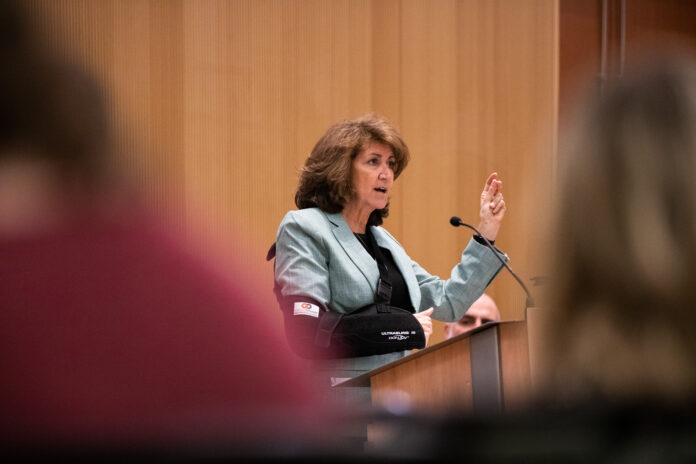On March 22, SRU welcomed its eighteenth president, Karen Riley, to campus before she officially steps into the role on July 1.
“It will be my honor to serve as your next president,” Riley said. “I’m both excited and humbled by this opportunity.”
SRU President William Behre, council of trustees chair Domenic Ionta, trustee Jeffery Smith and student trustee Brooklyn Graham introduced Riley to the community. Riley wore a sling on her right arm because of a torn rotator cuff, but expects to be back to normal in a couple of months.
“I’m sure you will have many goals and objectives during your tenure as president,” Smith said, “and I want you to understand that you have a council of trustees that is very caring and very supportive and will certainly embrace those goals and objectives.”
Riley plans to do three things to ensure SRU thrives for the next 133 years. First, she plans to listen.
Incoming presidents no longer have the time to say their first year will be spent listening, she said. However, she believes in subsidiarity, and that the people closest to the problem should know the most about it and probably have the best solutions.
“I think we’re in the human development business,” Riley said. “Our jobs are to facilitate growth for people along the entire human development pathway.”
“We are not bound by degrees, credentials or certificates,” she said. “We are bound by what society needs and how we can help it grow.”
Riley thinks SRU is positioned perfectly to move into that space.
Second, she wants to work with the strategic planning committee to formulate a plan central to their work instead of one that “sits on the shelf.”
She said many strategic plans fail to bring people together who are invested. She wants the strategic plan to be clear, active and for everyone to be completely invested.
“We want to position ourselves with programs that are upstream of changes in our employment and workforce development,” Riley said. “We want to be thinking ahead about upcoming trends and how we can position ourselves in those spaces.”
Third, Riley believes partnerships are the foundation of success. She wants SRU to be a good partner within the Pennsylvania State System of Higher Education (PASSHE) and the community, and to be the first university considered when creating industry partnerships.
Higher education is commonly criticized for being too slow and having too much bureaucracy. Instead, she wants SRU to be a university that gets things done while producing a great product.
“Pitt is too big. Penn State is too big. We’re not too big,” she said. “We can be nimble; we can be agile; we can adapt. We’re the perfect size in the perfect location to be the partner of choice.”
Riley is also knowledgeable of West Chester University’s and SRU’s status as one and two in the PASSHE system. Riley has not previously worked at a university which is part of a state system like SRU, but she said the strength of our system is in learning from each other to better address community needs.
However, her competitive nature strives to see SRU at the top of the PASSHE system.
To get to that position, she plans to grow SRU’s enrollment, retention and student sustainability, and also its partnership and fundraising potential. Riley met with SRU’s vice president of enrollment management later that day to examine previously chosen strategies.
Riley has a lot of experience fundraising. She was proud that one year at a previous institution, she out-fundraised the College of Education dean, the business school, the law school and the engineering department.
Being a good president requires understanding the totality of the job, she said. The president is both internally and externally focused by being an ambassador for SRU and serving the community.
She had also considered how to better serve and target prospective students who may not have considered a future in higher education.
Riley is familiar with the area as her husband is from the Pittsburgh region, but she was drawn by SRU’s mission. She recognizes SRU’s faculty and staff are dedicated to their students, education, social mobility and the desire for community service.
The best part of her visit was the students she met, and she hopes to remain accessible to them.
“The whole reason I came here is because I felt like people that work here are dedicated to students,” she said.
Riley also wants to help the university address employment shortages in various industries. In the healthcare field, SRU has already partnered with four community colleges to address the nationwide nursing shortage.
Riley wants to expand upon this by partnering with local healthcare systems to address their needs. She’s also interested in growing SRU’s young engineering program, safety management program and liberal arts programs.
“A strong liberal arts foundation prepares students to go into the jobs of the future,” she said. “Especially if we’re able to provide them with great internships and practicums.
Riley is also glad SRU provides opportunities for student athletes to continue to do what is meaningful for them while getting an education. She acknowledged student athletes graduate at a higher rate than the typical population.








